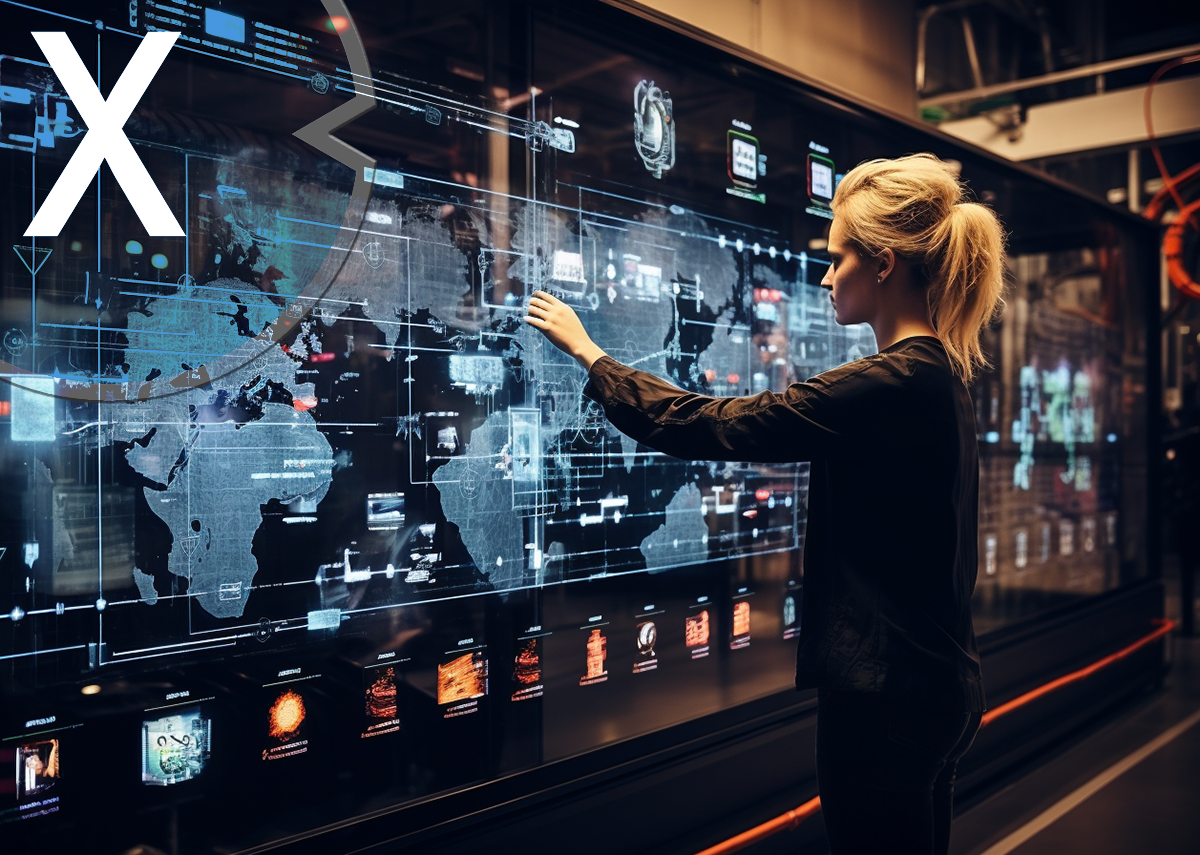KI, the hut is on fire! The AI age is here and how important is the human factor? 20x more important for marketing and retail in the AI age?
Language selection 📢
Published on: April 15, 2024 / update from: April 15, 2024 - Author: Konrad Wolfenstein
🧠🤖 The beginning of the AI age in Germany
🌐🚀 The beginning of the AI era in Germany cannot be set to a specific date, as the development and use of artificial intelligence (AI) is a gradual process with numerous contributions from various actors from science, industry and politics. In general, however, it can be said that interest and research in AI in Germany has increased steadily since the 1980s.
⏲️ The early years of AI research
The FAW (Research Institute for Application-Oriented Knowledge Processing) in Ulm was one of the early institutes in Germany to research AI and its applications. The institute was founded in 1987 and its goal was to bridge basic research and application in industry. I was there as a student and C64 nerd as a research assistant from 1988 to 1990.
In line with this topic:
🏛️ Important research institutions and initiatives
In the following decades, other important research institutions and initiatives were established in Germany to further advance the development of AI technologies. These include, among others, the German Research Center for Artificial Intelligence (DFKI), founded in 1988, and the various clusters of excellence that deal with cognitive sciences and intelligent systems.
💡 Funding from the federal government
In addition, the German Federal Government promoted AI research and development through various strategies and investments, in particular with the “strategy of artificial intelligence” of the Federal Government from 2018, which with an extensive package of measures and financing served to a leading location for AI to make and strengthen the application of the AI in social and economic context.
🌐 A decades-long process
Overall, one can speak of a beginning of the AI age in Germany that lasted several decades, with institutions such as the FAW Institute in Ulm making an early and important contribution to the development of this field in Germany.
🧠💡 The fourth industrial revolution with AI
🇩🇪📘 Fundamentals and influences of AI
The age of artificial intelligence (AI) has begun and is spreading at a rapid pace across various industries and aspects of life. Once entrenched as a concept in science fiction novels, AI is now a driving force in the technology world, influencing how we work, learn and communicate. In this era of advancing technological developments, it is fundamental to reassess and redefine the value and role of humans to ensure that the coexistence of humans and machines is beneficial and ethically responsible.
🌐🤖 AI and the world of work
AI derives its power from machines' ability to learn, adapt, and perform tasks previously reserved for human cognitive abilities. From algorithms that make precise medical diagnoses to autonomous driving to personal assistants that make our everyday lives easier, AI is driving innovations that expand human potential.
🔄🧑💼 AI as an opportunity and challenge in the workplace
But the impact of AI on working life is a double-edged sword. On the one hand, it enables increased efficiency by automating repetitive tasks and allows people to focus on creative and strategic tasks. On the other hand, it carries the risk of displacing human workers and thus poses threats to traditional jobs.
📚👩🎓 Education in the age of AI
The so-called fourth industrial revolution is accompanied by a transformation of global labor markets. New professional fields are emerging that require technological understanding and skills in dealing with AI systems. This change creates the need for lifelong learning to keep pace with technological advances. Education systems worldwide are faced with the challenge of designing curricula to prepare future generations to work with intelligent machines.
🤖🧭 Ethical considerations of AI
Another fundamental aspect is the ethical framework when dealing with AI. The question of the morality of machines and their decisions is becoming increasingly relevant. How can we ensure that AIs adhere to ethical standards when making decisions that affect human life? The development of AI systems that are non-discriminatory, transparent and comprehensible is one of the greatest challenges of our time.
🔒📊 Data protection in the AI world
Protecting privacy and data is a central topic in the discussion about AI. The volumes of data needed to “train” AI systems are immense, and often is not transparent where this data comes from and how they are used. Strong guidelines and laws are required to prevent abuse and to ensure control over their own data.
🏥🤝 AI in society
At the same time, AI offers the opportunity to overcome social problems. When used in medicine, for example, AI can help diagnose diseases more quickly or develop individualized therapeutic approaches that improve patient care. In the environmental sector, AI can analyze volumes of data to understand climate change and develop strategies to combat it.
🧠👩🔬 Humans and AI as partners
Partner work between humans and AI can offer innovative solutions to complex problems. Humans bring empathy, creativity and strategic thinking, while AIs efficiently process large amounts of data and recognize patterns hidden from the human eye. This synergy is the key to new insights and progress.
☝️🚫 Human control over AI
In a world where AI is increasingly making decisions, maintaining human control is crucial. Especially in sensitive areas such as the judiciary or the military, the final decision must not be left to an AI. The human factor remains paramount here to ensure ethical and moral considerations.
🤲🌐 Shaping the future with AI
The future of AI and human work will not be defined by the competition between the two forces, but by their integration and interaction. It's not about whether AI replaces humans, but rather how AI supports and augments humans to grow and prosper together. Education, comprehensive policy and international cooperation are necessary to create a world in which the human factor remains central and AI serves as a tool to maximize human well-being.
🤗🌟 The human aspect in the AI age
The human factor in the AI age also means promoting social intelligence and emotional skills. Machines may solve analytical problems, but human contact and understanding of emotional nuances are essential for social cohesion and mutual understanding.
🌍💡 Future challenges and opportunities
The interaction between humans and AI has the potential to lead to an improved society, but this depends on the conscious design by politics, business and each and every one of us. The question is no longer whether AI plays a role in our future, but rather how we will shape this role to preserve human integrity and dignity in an increasingly digitalized world. The future will be ours if we lead the development of AI in a way that puts people and their value at the center.
🎯🎯🎯 Benefit from Xpert.Digital's extensive, fivefold expertise in a comprehensive service package | R&D, XR, PR & SEM

AI & XR 3D Rendering Machine: Fivefold expertise from Xpert.Digital in a comprehensive service package, R&D XR, PR & SEM - Image: Xpert.Digital
Xpert.Digital has in-depth knowledge of various industries. This allows us to develop tailor-made strategies that are tailored precisely to the requirements and challenges of your specific market segment. By continually analyzing market trends and following industry developments, we can act with foresight and offer innovative solutions. Through the combination of experience and knowledge, we generate added value and give our customers a decisive competitive advantage.
More about it here:
🌐🧰 It is important to understand AI and automation as tools that support and augment human work, not replace it
🤝 It is important to understand AI and automation as tools that support and augment human work, not replace it. The key is to combine the analytical strengths of AI with the creative, empathetic and strategic capabilities of humans to make the customer experience human, powered by AI.
👥 People are the focus
At the core, humans remain central to creating relationships and trust, something that AI cannot yet fully replicate. The social component of marketing and commerce, which requires empathy, creativity and strategic thinking, remains fundamentally human. The trend is to see AI as an expansion of human capacity, allowing us to act more efficiently, more purposefully and more personally, rather than an era in which humans are replaced by machines.
🔄 AI as a partner
The constant development of AI technologies and their increasingly skilful use in practice shed the human factor in a new light. Instead of replacing humans, AI enhances human work by taking over routine tasks and creating new opportunities for creative and strategic action. Human qualities such as empathy, understanding and emotional intelligence will continue to be irreplaceable, especially in the interface between customers and brands. AI offers the potential not to displace the human factor in marketing and retail, but rather to enhance and redefine it.
🛠 Technology as a tool
The implementation of AI and automation in marketing and retail does not necessarily mean that the human factor becomes less important. Rather, AI can be used as a tool to expand human capabilities and deepen customer relationships. Here are some approaches to using AI and automation to not only increase efficiency but also make customers happier.
💡 20 Customer Experience Strategies
1. 🌟 Personalized experiences
🤖 AI-driven personalization
AI algorithms can analyze massive amounts of data to understand customer behavior and preferences. This information can be used to create tailored, personal shopping experiences, from customized product suggestions to personalized marketing messages.
2. ⏰ Real-time customer service
💬 24/7 support
Chatbots and virtual assistants can be available 24/7 to answer customer questions, solve problems, and provide information. They are immediately responsive, which increases customer satisfaction, especially with simple requests.
3. 🔮 Predictive analytics
📊 Market forecasts with AI
AI can be used to predict future customer behavior and market trends. Companies can use these findings to better tailor their offerings to future customer needs and thus increase customer satisfaction.
4. 🚀 More efficient processes
⚙️ Process optimization through automation
Automation can help streamline lengthy and error-prone processes. For example, warehouse management and logistics can be made more efficient through AI-supported systems, leading to faster delivery times and better inventory management - thereby increasing customer satisfaction.
5. 💞 Emotional Intelligence
❤️ Emotional understanding through AI
New advances in AI make it possible to take emotional components into account in customer communication. For example, moods can be read out of language or writing style and the interaction can be adjusted accordingly in order to deal with customers more empathetically.
6. 🛡 Ethical and trustworthy marketing
🤝 Trust through transparency
Transparency in the use of AI and data helps build trust with customers. Consumers want to understand how their data is used and that it is secure. Ethical use of AI can increase customer trust.
7. 🗺 Customer Journey Mapping
🛤 Customer journey analysis
AI can be used to analyze the entire customer journey from awareness to purchase and beyond. By understanding the journey, companies can improve experiences at every touchpoint, increasing customer satisfaction.
8. 🔄 Feedback and improvement
📊 Continuous optimization
AI systems can continuously analyze customer feedback to improve both products and services. By collecting and evaluating reviews, comments and direct feedback, companies can quickly respond to customer needs and accelerate the product development cycle.
9 🔗 Omni-channel integration
🛍️ Unified customer experience
Customers use different channels to interact with brands. AI can help create a consistent customer experience across all channels. For example, AI can synchronize user behavior across the website, mobile apps and physical stores, ensuring a seamless experience.
10. 🎯 Proactive support
🚀 Preventive customer service measures
Instead of just reacting to problems, AI can be used to identify potential problems before they impact the customer. This can ensure smoother operations and higher customer satisfaction as companies can proactively take steps to improve customer care.
11. 📝 Content generation
✍️ Automated content creation
AI-driven content creation tools can help marketers create relevant and engaging content based on the interests and needs of the target audience. They can save time by using data analytics to find topics that resonate with the audience and automatically create content based on them.
12. 🎓 Training and continuing education opportunities
👨🏫 Personalized learning programs
AI can be used to create customized learning and development programs for employees to ensure they have the necessary skills and knowledge to exceed customer expectations. Intelligent learning systems can personalize and accelerate the learning process.
13. 🤔 Decision Making
💡 Data-based decision support
AI can improve the human decision-making process by providing data analysis and pattern recognition. This helps marketing and commercial teams make informed decisions that increase customer satisfaction and operational efficiency.
14. 💖 Long-term customer loyalty
🔁 Customer loyalty through personalization
By using AI for personalized recommendations and rewards, companies can increase customer loyalty. AI can recognize patterns in purchase stories and create personalized incentives based on them, encouraging customers to do business with a brand repeatedly.
15. 🚨 Early warning systems and risk management
⚠️ Proactive risk assessment
By processing large amounts of data, AI can help identify and mitigate risks. This can range from predicting inventory overages or product shortages to detecting fraud or changing customer sentiments. Timely intervention can prevent negative customer experiences and protect the brand.
16. 🤖 Intelligent automation in customer service
🔄 Increased efficiency through AI
With AI, routine requests can be processed automatically, giving employees more time to devote to more complex requests that require human intervention. This can reduce workload and allows customer service to respond to customer concerns quickly and efficiently.
17. 🛑 Avoiding human errors
🚫 Reduction of operating errors
Automation can reduce errors caused by human fatigue or oversight. This leads to more consistent performance in areas such as order processing, invoicing and customer service, which in turn increases customer satisfaction.
18. ⏱ Reduction in waiting times
🕒 Optimized time management
AI can help predict fluctuations in demand and plan resources accordingly, reducing shortages. Customers benefit from faster response times and better availability of the desired products and services.
19. 💸 Dynamic Pricing
💰 Price flexibility through intelligence
Using AI, pricing can be adjusted in real time based on market conditions, inventory levels and customer behavior. This may mean cheaper prices for customers and optimal inventory turnover rates and margins for retailers.
20. 💡 Innovation and product development
🌟 AI-Inspired Innovations
AI-based insights can drive product development by showing what features or products customers want or what problems they have with current products. By incorporating these findings into innovation processes, companies can develop products and services that better meet customer needs.
🔄📈 B2B trading platforms support – strategic planning and support for exports and the global economy with Xpert.Digital 💡
Business-to-business (B2B) trading platforms have become a critical part of global trade dynamics and thus a driving force for exports and global economic development. These platforms offer significant benefits to companies of all sizes, particularly SMEs – small and medium-sized businesses – which are often considered the backbone of the German economy. In a world where digital technologies are becoming increasingly prominent, the ability to adapt and integrate is crucial to success in global competition.
More about it here:
We are there for you - advice - planning - implementation - project management
Industry Hub Blog
An industry hub blog is a digital platform where content related to specific industries, sectors or business areas is published. The term "hub" refers to a central location or hub where relevant information, news, insights and resources are made available to professionals, entrepreneurs, investors and those interested in a particular industry. An Industry Hub Blog serves as an information source and discussion forum designed to connect the community, share knowledge and follow the latest developments in the respective industry.
I would be happy to serve as your personal advisor.
You can contact me by filling out the contact form below or simply call me on +49 89 89 674 804 (Munich) .
I'm looking forward to our joint project.
Features of an Industry Hub Blog
Industry-specific content
An industry hub blog focuses on a specific industry or sector of the economy. The published content covers topics that are relevant to professionals and interested parties in this industry.
Latest news
The blog provides current news and updates on developments, trends, market events and events in the respective industry.
Expertise and insights
Industry Hub Blogs provide expertise, insights and analysis from experts and industry insiders. This information can help develop a deeper understanding of the challenges and opportunities in the industry.
Best practices and tips
The blog can provide best practices, advice and tips for companies and professionals in the industry. This can range from business strategies to technology trends.
Networking and community building
Readers often have the opportunity to leave comments and participate in discussions. This creates an online community of like-minded people who can share ideas and connect with each other.
Resources and tools
Industry Hub Blogs can provide links to useful resources, tools, guides and reports relevant to the industry.
Events and conferences
The blog can also provide information about upcoming industry events, conferences, trade shows and webinars.
Xpert.Digital - Konrad Wolfenstein
Xpert.Digital is a hub for industry with a focus on digitalization, mechanical engineering, logistics/intralogistics and photovoltaics.
With our 360° business development solution, we support well-known companies from new business to after sales.
Market intelligence, smarketing, marketing automation, content development, PR, mail campaigns, personalized social media and lead nurturing are part of our digital tools.
You can find out more at: www.xpert.digital - www.xpert.solar - www.xpert.plus
Industrial & B2B Business Metaverse: Reduce costs with XR technology for photorealistic product images (XR 3D rendering machine)
XR technology offers a superior solution for creating photorealistic images and allows companies to free themselves from the expensive fees of external media agencies. It is common knowledge that media agencies charge high costs to create such images as it requires expertise, special software and collaboration with various experts.
More about it here:


























